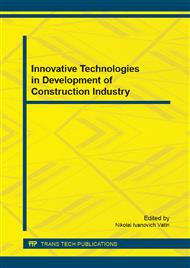p.1019
p.1025
p.1031
p.1038
p.1049
p.1057
p.1063
p.1072
p.1079
Residential Stock Management Based on Input-Output Balance Model
Abstract:
The entities of residential stock management have been determined and a structurally-logical model of entities interaction in the markets of residential and municipal services ensuring economic relations in the process of residential stock management on the basis of demand and services proposition mechanism.The interaction model takes into consideration all the entities concerned, which participate in the residential stock management: individuals, organizations of commercial and non-commercial profile, state government bodies and local self-government authorities. The economical and mathematical model developed on the basis of input-output balance matrix implements economical interactions of the major economic entities through reaching a balance between incomes and expenditures thereof. It has been used as the basis to justify a necessity for growing investments into a residential sphere and redistribution of sources thereof towards increasing a share of private investment, additional sources thereof have been defined. It adds to the principles, formulated Concepts of the long-term social and economic development of the Russian Federation for a period up to 2020.
Info:
Periodical:
Pages:
1049-1054
Citation:
Online since:
January 2015
Authors:
Price:
Сopyright:
© 2015 Trans Tech Publications Ltd. All Rights Reserved
Share:
Citation:


